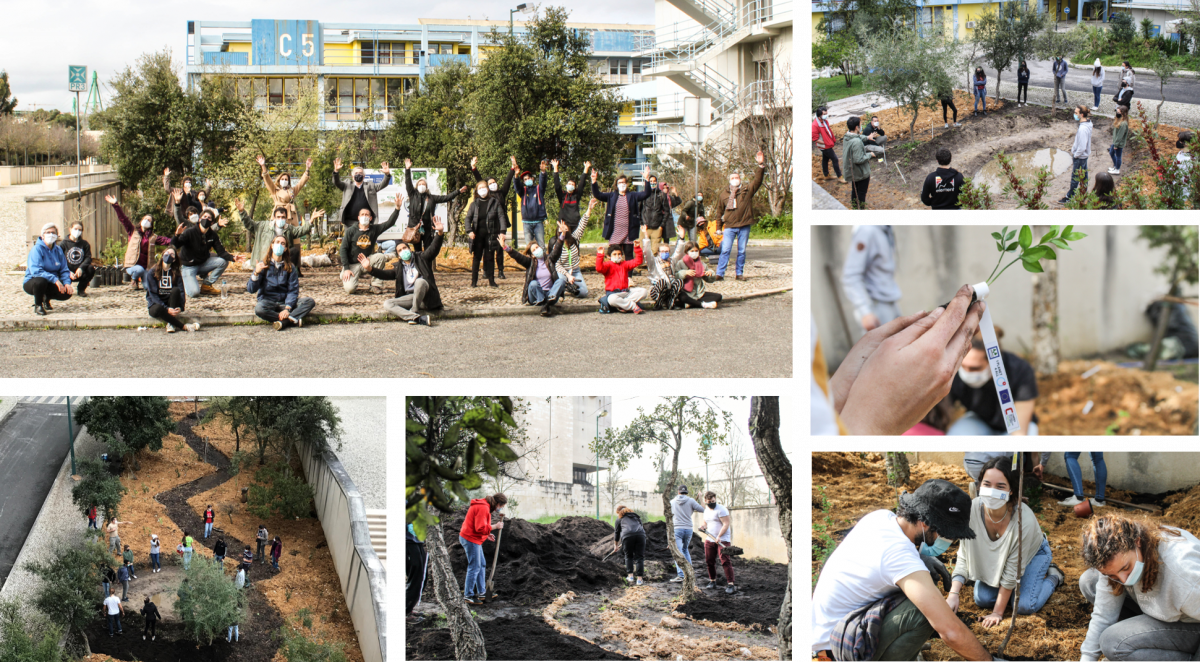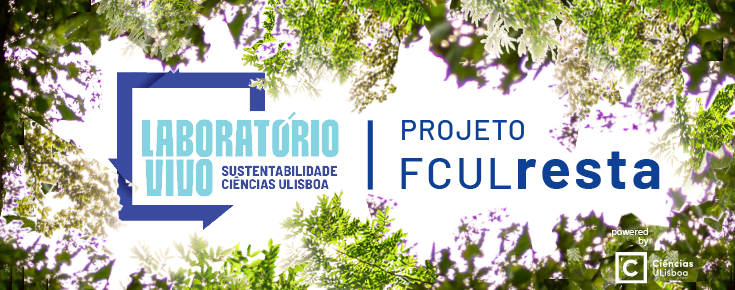

FCULresta is a tiny, dense, biodiverse and multifunctional forest, in an urban context. It aims to become a hands-on reference on a transdisciplinary approach, with a profound mobilization of society towards climate action, enhancement of urban biodiversity and other Sustainable Development Goals of the Faculty of Sciences of the University of Lisbon (Ciências ULisboa) and its city as the Green Capital of Europe 2020. Beyond the institutional support and its practical component, FCULresta aims to have a strong scientific component as well, thus contributing to a deeper understanding of the function these naturalized areas can have in an urban environment.
This project has, as its seed, the European project 1Planet4All - Empowering youth, living EU values, tackling climate change - which comes together through the cooperation of 14 non-governmental agencies from all across Europe, that work on some of the most fragile countries around the world directly affected by Climate Change, from which VIDA takes part (Portuguese Coordinator). This European project wishes to bring both solidarity and interconnection dimensions with actions such as FCULresta, connecting the Global North and South, promoting the idea that Climate Change is a common cause and a common problem.
FCULresta applied and aims to scientifically evaluate even further the Miyawaki Method. This method suggests that, after the creation of a low ecological footprint and high impact mini forest, it can: have a swift growth; high carbon absorption rates; the ability to attract a high number of new plant and animal species; excellent at retaining water; improve the surrounding area’s air (reducing polluting particles) and reduce noise pollution; help with the thermal comfort of the area.
Given the role and duty of Ciências ULisboa in scientific production, FCULresta will act as a case study to evaluate the true potential of this method on climate action in the Mediterranean and other ecosystem services in the urban context, through different research questions that aim to look at the project as a whole. FCULresta is coordinated by Sustainability Living Lab @ Ciências ULisboa, which manages, monitories and offers research opportunities for the surrounding community, in order to prove the worth of this kind of mini forests and to promote the replication of this initiative not only in the University of Lisbon as well as the rest of the national territory and Planet.
Coordinators: António Alexandre, David Avelar
Project members: Margarida Santos-Reis, Jorge Maia Alves, Cristina Cruz, Otília Correia, Rui Rebelo, Pedro Pinho, Tiago Marques, Cristina Catita
For further information, contact sustentabilidade@ciencias.ulisboa.pt.
Planting the FCULresta
In the first week of March, planting begins (initially planned for December). Due to the worsening pandemic situation, its implementation was successively postponed. However, further postponement would compromise the whole project. In fact, the appropriate time for planting the Forest is winter, in order to avoid very high plant mortality rates.
The timing of the planting was adapted to the legal restrictions relating to COVID-19, and in particular to the fact that scientific research activities requiring face-to-face work, as is obviously the case, should not be jeopardised. All safety needs have been taken into account, with the necessary elements for the planting of the Forest being split into teams, which took place in shifts, during a week, from 1 to 5 March.
FCULresta Formation
The FCULresta training aims to share technical-scientific information about all phases of the project, people involved and partnerships established. Pretends to integrate different perspectives on FCULresta from a wide range of scientific institutions and areas. It is divided into three complementary components:
Technique - structured in five sequential modules with technical information on the application of the method;
Institutional - perspective of the European project and the institution that streamlines and welcomes the project;
Scientific - Point of view of different scientific areas about FCULresta.
(Detailed description and videos only available in portuguese)
FCULresta, one year later
There is a solar cycle, the 315 m2 lawn was transformed into what is intended to be a dense and biodiverse miniforest. What can we observe past the first year? Will there be reasons to celebrate?
Check it all out in the article published by the FCULresta team.
FCULresta, two years later | A new mural of FCULresta
It's been two years since the Miyawaki method debuted in Lisbon through our carnamous FCULresta. Since then, these forests have multiplied throughout the city, showing their resilience and rapid growth in urban spaces, thanks to the planting in density of native species. See an article from "Mensagem de Lisboa" about this project.
FCULresta was a pioneer and launched seed and a Guide to the integration of biodiversity in teaching is born.
From March 10, tasks will be made available, day by day, with videos that you can follow (in this link http://vida.org.pt/guia-miniflorestas/) until March 21, marking forest day, the date on which will be launched the complete Guide "Mini Forests for MegaLearning – A guide for the integration of urban biodiversity in teaching"
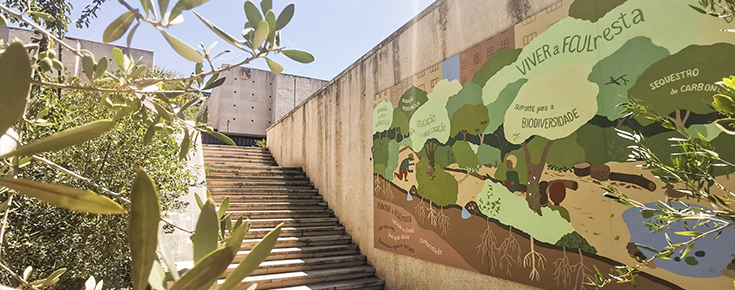
More than two years after the planting of FCULresta, public interest in this project remains constant and vibrant. There are more than 60,000 visits to space, based on the number of views indicator on Google Maps.
Thus, a FCULresta mural is born, integrating an artistic and communicational dimension to the project. The mural reproduces the essential elements for "Planting FCULresta", inspired by the Miyawaki method, as well as the main benefits for those who want to "Live FCULresta". See the full story
MiniForests Guide for MegaLearning - A guide to the integration of urban biodiversity into education.
The Guide was promoted by the NGDO VIDA under the project "1Planet4All", with the financial support of the European Union and Camões, IP. It was facilitated by 2adapt in close collaboration with several institutions: the Living Laboratory for Sustainability of the Faculty of Sciences of Lisbon, HortaFCUL, the NGO Urbem, the Alfredo dos Reis Silveira Secondary School, and the Institute of Army Pupils. It started from the experience observed in the implementation of several different mini-forests contexts: academic (with FCULresta), school (miniforests of the Alfredo dos Reis Silveira Secondary School and Instituto Pupilos do Exército) - promoted under the 1Planet4All project, and also in a community context (miniforests of Areeiro and Bela Vista, in Lisbon, by the hand of Urbem with the support of CM Lisboa).
This guide is freely accessible: anyone can download from the link above. In it, they can find the fundamental steps, resources and tools necessary for the creation of mini-forests in a school/community context.
It aims to be an important resource for teachers and educators who are interested in enhancing the planting of new Miyawaki miniforests!
Download here the Guide in high resolution (72MB) or low resolution (5MB)
Mini-Forest Network
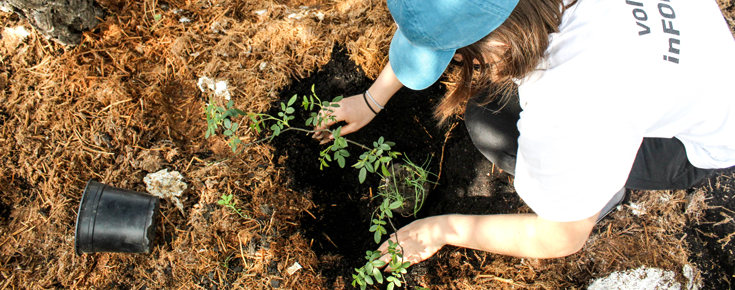
One year after the launch of the "Mini-Forests for Mega-Learning" Guide, we started to activate the networks we know and now we are mapping the mini-forests, in what we call the Mini-Forest Network, which as you can see are already 15:
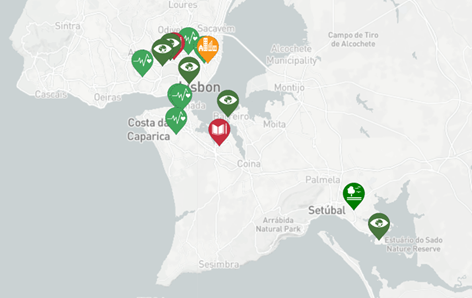
Thus, we began to give visibility to this positive influence that Sciences has had reflected, in a way, in this article: FCULresta: the "mother forest" of a network of mini-forests
References about the project:
- Degree dissertation - "Time is money and compost brown gold." The Berkeley composting method compared with conventional composting with regard to the requirements of the Bundesgütegemeinschaft Kompost e.V., Nadine Wulf, 2021
- Article about FCULresta, HortaFCUL and Permalab featured in a report by journalist Ana da Cunha from "Mensagem de Lisboa". 17/03/2022
- https://www.youtube.com/watch?v=KBPoJnx0Vzk, report by France 24, the public TV channel in France, on mini-forests 29/06/2023. (FCULresta at minute ≈ 06:20). 15/11/2023
-
Miniforest of Ciências ULisboa: a success story recognized by the European Union, article by Green Savers. 21/02/2024
- https://capacity4dev.europa.eu/news/new-forests-town_en - featured as one of the projects with the greatest impact of the "EU DEAR: Development Education and Awareness Raising" program
-
Mini-Forest Network, mapping of mini-forests. 20/03/2024
-
https://www.rtp.pt/play/p12652/e779153/portugal-em-direto/1251054, RTP report on the mini forest. 26/06/204
- News GreenSavers Minifloresta da Ciências ULisboa: “Após 3 anos, temos uma sobrevivência das espécies originalmente plantadas de cerca de 70%”. 20/02/2025
For more information, contact sustentabilidade@ciencias.ulisboa.pt.


